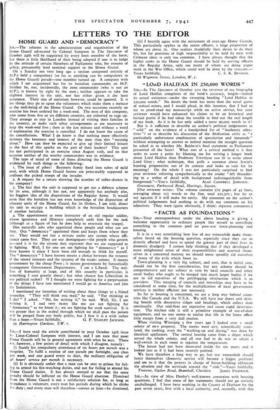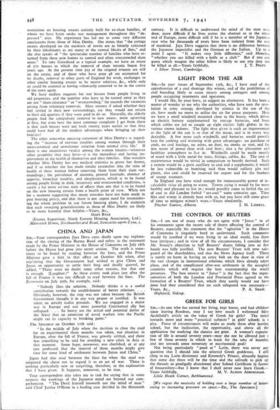SIR, —In view of Miss Denby's well-known connexion with housing questions,
I feel that some of her statements should not go entirely unchallenged. I have been working in the County of Durham for the past seven years, first with a local authority, and, secondly, with this association on housing estates entirely built for ex-slum families, of whom we have 8,000 under our management throughout this " de- pressed " area. My experience has led me to some very different conclusions from those of Miss Denby. She states that " the cottage estates developed on the outskirts of towns are as bitterly criticised by their inhabitants as are many of the central blozics of flats," and she also speaks of " the spectacular number of families who have re- turned from these new homes to central and often overcrowded slum areas." To take Gateshead as a typical example, we have an estate of 572 houses to which the removal of slum tenants began five years ago. At the present time 503 of the original tenants are still on the estate, and of those who have gone 48 are accounted for by deaths, removal to other parts of England for work, exchanges to other similar housing estates to be nearer relatives, &c., while only 21 could be counted as having voluntarily removed to be in the centre of the town again We have endless requests for our houses from people living in old properties, and the number who have to be turned away as they are not " slum clearance " or " overcrowding," far exceeds the vacancies arising from voluntary removals. Most tenants if asked whether' they feel settled in their new surroundings, say they would not return to their old quarters if they were paid to do so. Naturally, the elderly people find the compulsory removal to new estate. more upsetting at first, but even here the most common complaint I get from them is that such houses were not built twenty years earlier so that they could have had all the modern advantages when bringing up their families!
The other somewhat amazing statement of Miss Denby s is regard- ing the " increase of nervous troubles among women through their unaccustomed and unwelcome isolation from normal civic life.' If there is one unanimous verdict among the women tenants—whatever other grumbles they may have—it is the immediate and lasting im- provement in the health of themselves and their families. One wonders whether Miss Denby has any medical statistics to prove her theory, and if so whether she has made similar researches into Lhe state of health of these women before removing them from their slum sur- roundings ; the prevalence of anaemia, general lassitude, absence of appetite, bronchial troubles, and sleeplessness, which is to be found among people living in dark, insanitary and overcrowded conditions, is surely a far more serious state of affairs than any that is to be found on the new housing estates from a health point of view. While not for a moment suggesting that many mistakes have not been made in past housing policy, and that there is not urgent need for reconsider- ing the whole problem in our future housing plans, I do maintain that such sweeping generalisations as those of Miss Denby are likely to be more harmful than helpful.—Yours, &c.,
MARY RYLE
(Estates Supervisor, North Eastern Housing Association, Ltd.). Metrovick House, Northumberiand Road, Newcastle-upon-Tyne, r.























 Previous page
Previous page